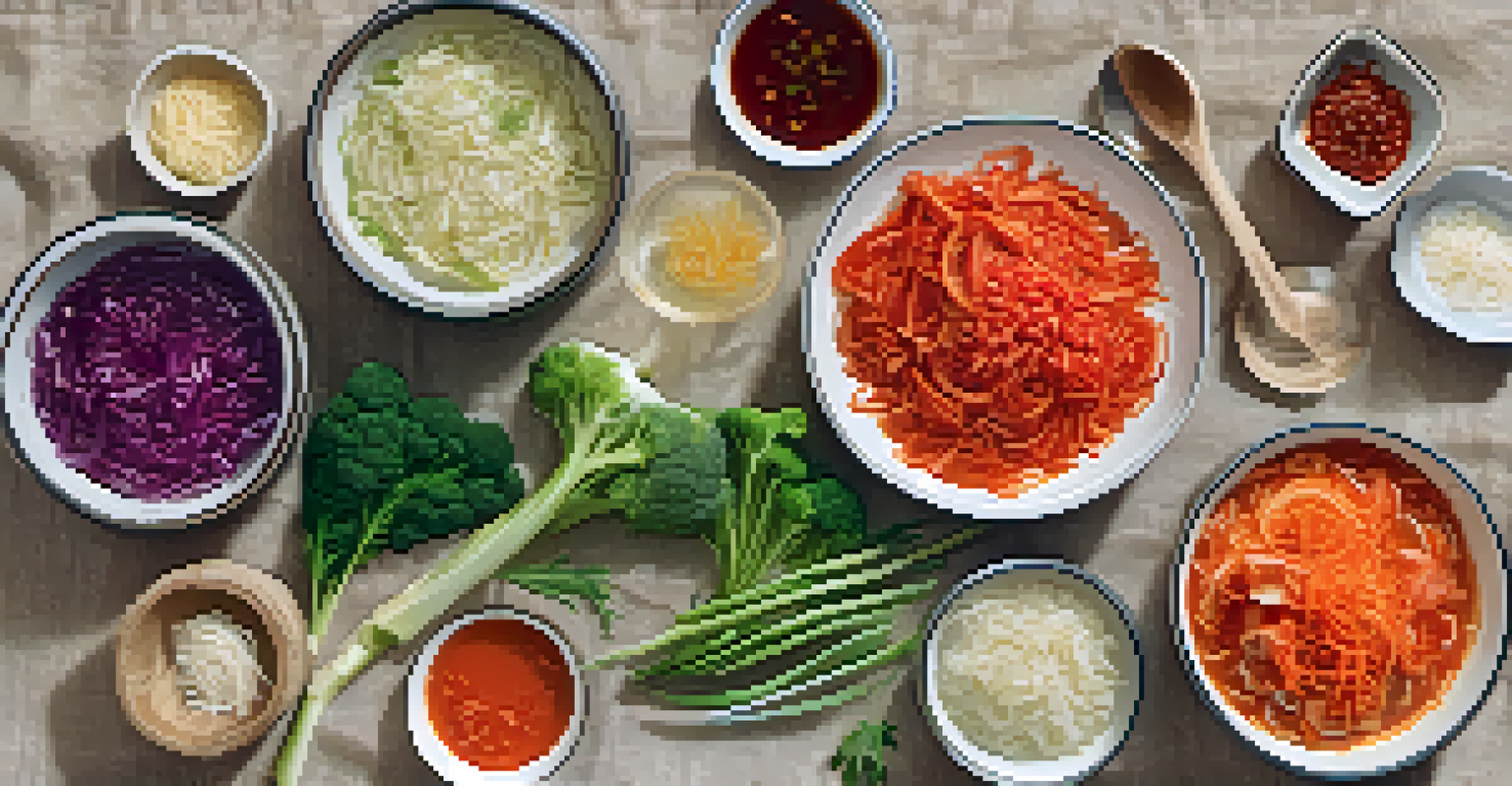The Role of Probiotics in a Vegetarian Fermented Diet

Understanding Probiotics and Their Benefits
Probiotics are live bacteria that provide health benefits when consumed in adequate amounts. Often dubbed 'good' bacteria, they play a crucial role in maintaining gut health, supporting digestion, and even enhancing immunity. Including probiotics in your diet can help balance the gut microbiome, which is essential for overall well-being.
Probiotics are the good bacteria that help maintain a healthy gut, which is crucial for overall health.
In a vegetarian diet, probiotics are particularly valuable as they help ferment plant-based foods, making nutrients more accessible. For instance, fermented foods like yogurt, sauerkraut, and kimchi not only introduce probiotics but also enhance the flavor and texture of meals. This means that vegetarians can enjoy a variety of delicious dishes while reaping the health benefits of probiotics.
Moreover, probiotics are linked to mental health benefits, including reduced anxiety and depression. This connection between gut health and mental well-being underscores the importance of incorporating these beneficial bacteria into a vegetarian diet, creating a holistic approach to health.
Fermented Foods: A Vegetarian's Secret Weapon
Fermented foods are a treasure trove of probiotics, and many vegetarian options are available. Examples like tempeh, miso, and kombucha not only add unique flavors to dishes but also contribute to gut health. By incorporating these foods into your meals, you can boost your probiotic intake without compromising your dietary choices.

The fermentation process breaks down complex carbohydrates, making it easier for the body to absorb nutrients. For vegetarians, this means that vital nutrients found in beans, grains, and vegetables can be better utilized. Plus, the presence of probiotics in these foods can help counteract any digestive discomfort that may arise from a fiber-rich diet.
Probiotics Boost Gut Health
Probiotics are essential for maintaining a balanced gut microbiome, which supports digestion and overall well-being.
Additionally, eating a variety of fermented foods helps diversify the gut microbiome, which is essential for optimal health. Just like a garden flourishes with different plants, our gut thrives on a range of probiotics, making it vital for vegetarians to explore and enjoy these diverse options.
The Science Behind Probiotics and Gut Health
Research shows that probiotics can significantly impact gut health by restoring the balance of gut bacteria. This balance is crucial because an imbalance can lead to digestive issues, such as bloating, gas, or even more severe conditions like irritable bowel syndrome (IBS). For vegetarians, ensuring a healthy gut can enhance nutrient absorption and overall digestive comfort.
Fermented foods are a delicious way to support your gut health and overall well-being.
Probiotics work by inhibiting the growth of harmful bacteria, thus reducing the risk of infections and diseases. They can also help in the production of certain vitamins, like vitamin K and some B vitamins, which are essential for energy metabolism. This makes probiotics a powerful ally for vegetarians who may rely on plant-based sources for their nutrients.
Moreover, the benefits of probiotics extend beyond the gut. Emerging studies suggest that a healthy gut microbiome can influence factors like weight management and immune response. Therefore, integrating probiotics into a vegetarian diet not only supports digestion but also bolsters overall health and vitality.
Choosing the Right Probiotics for Your Diet
When selecting probiotics, it's essential to look for products that contain live and active cultures. Labels often specify strains of bacteria, and different strains can offer various health benefits. For those on a vegetarian diet, options like plant-based yogurts or probiotic supplements can help ensure you're getting the right bacteria for your needs.
It's also important to consider the CFU count, which stands for colony-forming units. This number indicates how many viable probiotics are present in a serving, and a higher CFU count doesn't always mean better. Instead, focus on products with proven efficacy for your health goals, especially those that suit a vegetarian lifestyle.
Fermented Foods Enhance Nutrition
Incorporating fermented foods like kimchi and tempeh into a vegetarian diet not only adds flavor but also improves nutrient absorption.
Lastly, always check for added sugars or artificial ingredients in probiotic products. Many commercial options can be laden with unnecessary additives that detract from their health benefits. As a rule of thumb, opt for whole foods or minimally processed products to enjoy the full spectrum of probiotics in your vegetarian diet.
Incorporating Probiotics into Everyday Meals
Incorporating probiotics into your meals can be both easy and enjoyable. Start your day with a smoothie that includes a scoop of plant-based yogurt or a splash of kefir. This not only adds creaminess but also packs a probiotic punch that sets a positive tone for your day. Pairing it with fruits and greens can further enhance the nutrient profile.
For lunch, consider adding fermented vegetables like sauerkraut or kimchi to your salads or sandwiches. These ingredients can elevate the taste while providing beneficial bacteria that support your gut health. You can even experiment with toppings like miso dressing or tempeh to make your meals more exciting and nutritious.
Dinner offers even more opportunities to get creative with probiotics. Dishes like stir-fries with fermented tofu or curry with coconut yogurt can not only be delicious but also boost your probiotic intake effortlessly. By thinking outside the box, you can easily transform ordinary meals into probiotic-rich feasts!
Potential Risks and Considerations
While probiotics are generally safe for most people, it's important to be mindful of individual health conditions. Those with compromised immune systems or underlying health issues should consult a healthcare provider before introducing probiotics into their diet. It's always better to err on the side of caution, especially when it comes to health.
Some individuals may experience mild digestive discomfort when first adding probiotics to their diet. This can include bloating or gas, which typically subsides as the body adjusts. If discomfort persists, it may be wise to reassess the types or quantities of probiotics being consumed.
Future of Probiotics is Bright
As plant-based diets gain popularity, innovative probiotic products are emerging, making it easier for vegetarians to enjoy gut health benefits.
Lastly, remember that probiotics are just one part of a balanced diet. While they offer numerous health benefits, they should complement a variety of whole foods rich in nutrients. Emphasizing a well-rounded vegetarian diet along with probiotics can maximize health benefits and contribute to overall wellness.
The Future of Probiotics in Plant-Based Diets
As the popularity of plant-based diets continues to rise, so does the interest in probiotics. Innovations in food technology are leading to the development of new fermented products that cater specifically to vegetarians. This means that the future looks bright for those who want to incorporate probiotics into their meals without compromising their dietary choices.
Researchers are also exploring the potential of probiotics beyond traditional foods, looking into how they can be integrated into snacks and beverages. This could make it even easier for vegetarians to enjoy the benefits of probiotics on the go. Imagine snacking on a probiotic-rich granola bar or sipping a delicious probiotic smoothie while out and about!

Ultimately, as awareness grows about the importance of gut health, more people are likely to embrace probiotics as part of their lifestyle. For vegetarians, this means not only enhancing their diets but also contributing to a broader movement towards health-conscious eating. The future of probiotics in plant-based diets is not just promising—it's exciting!